Wiki on Adonais
Adonais: An Elegy on the Death of John Keats, Author of Endymion, Hyperion, etc. (/ˌædoʊˈneɪ.ɪs/) is a pastoral elegy written by Percy Bysshe Shelley for John Keats in 1821, and widely regarded as one of Shelley's best and most well-known works.
The poem, which is in 495 lines in 55 Spenserian stanzas, was composed in the spring of 1821 immediately after 11 April, when Shelley heard of Keats' death (seven weeks earlier). It is a pastoral elegy, in the English tradition of John Milton's Lycidas. Shelley had studied and translated classical elegies.
It was published by Charles Ollier in July 1821 (see 1821 in poetry) with a preface in which Shelley made the mistaken assertion that Keats had died from a rupture of the lung induced by rage at the unfairly harsh reviews of his verse in the Quarterly Review and other journals.
The English Protestant Cemetery in Rome
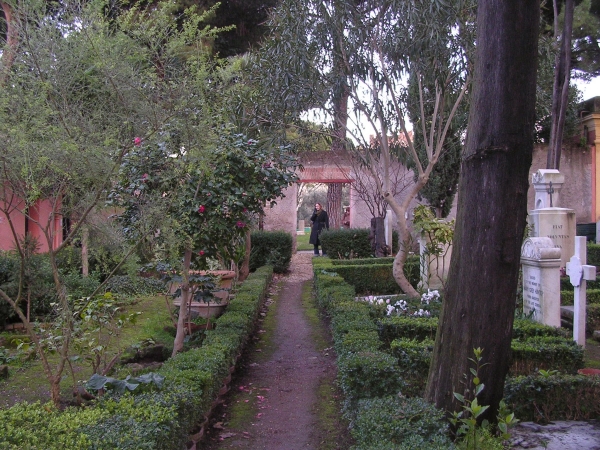
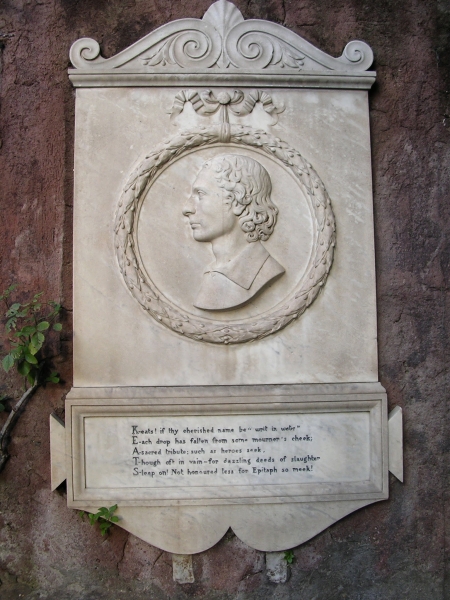
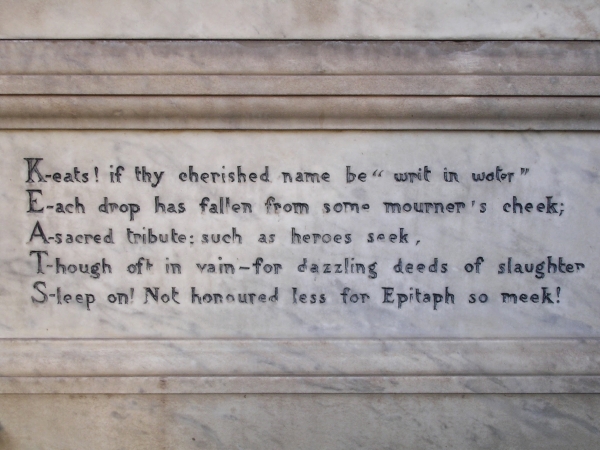
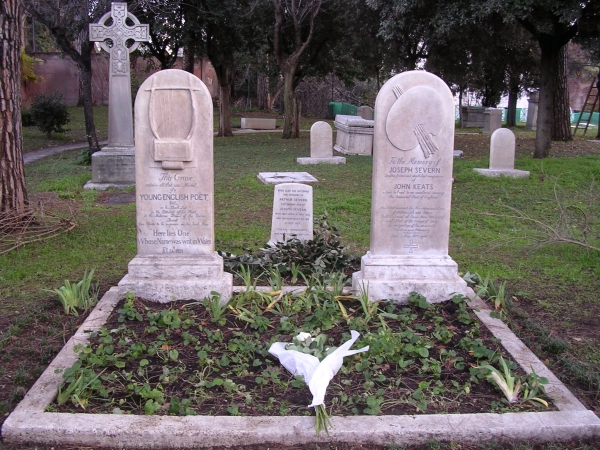
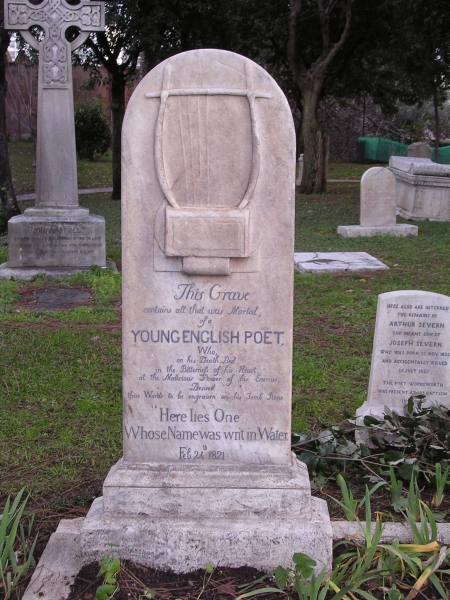
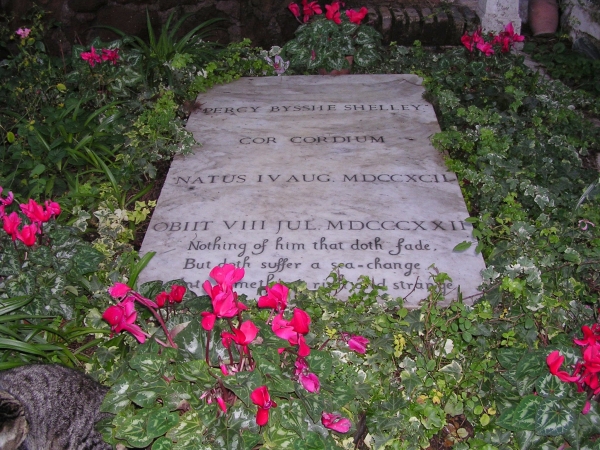
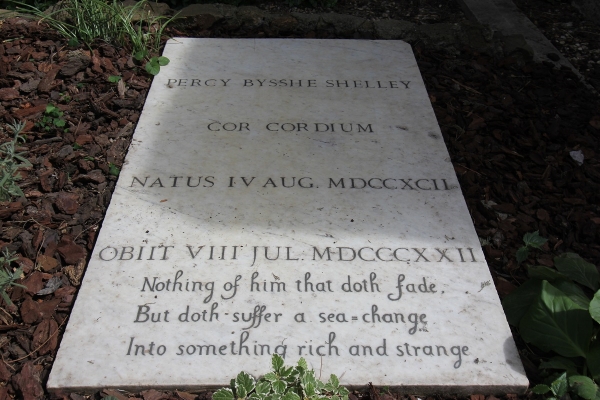

Adonais
II(2)
Where wert thou, mighty Mother, when he lay,
When thy Son lay, pierc'd by the shaft which flies
In darkness?(the ananymity of the review of Endymion) where was lorn(forlorn) Urania(She had originally been the Muse of astronomy, but the name was also an epithet for Venus. Shelley converts Venus Urania into the mother of Adonais)
When Adonais died? With veiled eyes,
'Mid listening Echoes, in her Paradise
She sate, while one, with soft enamour'd breath,
Rekindled all the fading melodies,
With which, like flowers that mock the corse(corpse) beneath,
He had adorn'd and hid the coming bulk(A heap, or a dead body, carcase) of Death.
LII(52)
The One remains, the many change and pass;
Heaven's light forever shines, Earth's shadows fly;
Life, like a dome of many-colour'd glass,
Stains the white radiance of Eternity,
Until Death tramples it to fragments.(Earthly life colors["stains"] the pure white light of the One, which is the source of all light. The azure sky, flower, etc., exemplify earthly colors that, however beautiful, fall far short of the "glory" of the pure Light that they transmit but also refract["transfuse"])—Die, If thou wouldst be with that which thou dost seek!
Follow where all is fled!—Rome's azure sky,
Flowers, ruins, statues, music, words, are weak
The glory they transfuse with fitting truth to speak.
오든(W. H. Auden), “장례식 블루스”
Funeral Blues
장례식 블루스
Stop all the clocks, cut off the telephone,
Prevent the dog from barking with the juicy bone.
Silence the pianos and, with muffled drum,
Bring out the coffin. Let the mourners come.
시계를 모두 멈춰라. 전화선도 끊어 버려라.
육즙이 가득한 뼈를 물고 있는 저 강아지도 못 짖게 하라.
피아노 소리도 죽이고, 숨죽인 북소리와 함께
관을 내오라. 조문객을 들이라.
Let aeroplanes circle moaning overhead
Scribbling in the sky the message: “He is dead!”
Put crepe bows around the white necks of the public doves.
Let the traffic policemen wear black cotton gloves.
비행기가 흐느끼며 상공을 맴돌게 하라
그러면서 하늘에 이렇게 쓰게 하라. “그가 죽었다!”
공원에 있는 비둘기의 하얀 목덜미에도 상장(喪章)을 매라.
거리의 교통순경들도 검은 색 목장갑을 끼라고 해라.
He was my north, my south, my east and west,
My working week and Sunday rest,
My noon, my midnight, my talk, my song.
I thought that love would last forever; I was wrong.
그는 나의 북쪽과 남쪽, 나의 동쪽과 서쪽이었다.
나의 일하는 평일의 나날이었고, 일요일의 안식이었다.
나의 정오였고, 나의 자정이었고, 나의 이야기, 나의 노래였다.
나는 사랑이 영원할 줄 알았다. 내가 틀렸다.
The stars are not wanted now; put out every one.
Pack up the moon and dismantle the sun.
Pour away the ocean and sweep up the wood.
For nothing now can come to any good.
별도 이젠 다 필요없다. 별빛 따윈 다 꺼버려라.
달도 가리고, 해도 치워라.
바닷물도 다 따라 버리고, 숲도 모두 밀어버려라.
이젠 아무 것도 아무 소용이 없으니까.
Auden의 또 다른 Elegy
In Memory of W. B. Yeats
by W. H. Auden
I
He disappeared in the dead of winter:
The brooks were frozen, the airports almost deserted,
And snow disfigured the public statues;
The mercury sank in the mouth of the dying day.
What instruments we have agree
The day of his death was a dark cold day.
그는 죽음 같은 겨울날 사라졌다.
개울은 얼었고, 공항엔 인적이 끊겼으며,
눈 내린 동상들은 제 모습을 잃었다.
수은주는 머물어가는 하루의 입구에서 뚝 떨어졌다.
어떤 기구로 재든 상관없이
그가 죽은 날은 어둡고 추운 날이었다.
Far from his illness
The wolves ran on through the evergreen forests,
The peasant river was untempted by the fashionable quays;
By mourning tongues
The death of the poet was kept from his poems.
그의 병에는 아랑곳없이
늑대들은 푸르른 숲속을 여전히 뛰어다녔고,
농촌의 강물은 맵시있는 선창가를 무심하게 지나쳤으며,
그의 시는 시인의 죽음을 알지 못했다.
But for him it was his last afternoon as himself,
An afternoon of nurses and rumours;
The provinces of his body revolted,
The squares of his mind were empty,
Silence invaded the suburbs,
The current of his feeling failed; he became his admirers.
그러나 그에게는 그때가 정신이 있었던 마지막 오후였고,
간호원들이 뛰어다니고 소문이 흉흉했던 그런 오후였다.
그의 몸은 구역마다 반란을 일으켰고
그의 마음의 광장들은 텅 비었었다.
그 주변부도 침묵으로 뒤덮이고,
그의 감정의 강물은 뚝 끊겼다. 그렇게 그는 그의 숭배자가 되었다.
Now he is scattered among a hundred cities
And wholly given over to unfamiliar affections,
To find his happiness in another kind of wood
And be punished under a foreign code of conscience.
The words of a dead man
Are modified in the guts of the living.
이제 그는 수백의 도시들에 뿌려졌고,
익숙치않은 애정에 완전히 바쳐졌다.
또 다른 숲에서 행복을 찾거나
낯선 양심의 규약에 따라 처벌받도록.
죽은 자의 말들은
산 자의 뱃속에서 변형되기 마련이니까.
But in the importance and noise of to-morrow
When the brokers are roaring like beasts on the floor of the Bourse,
And the poor have the sufferings to which they are fairly accustomed,
And each in the cell of himself is almost convinced of his freedom,
A few thousand will think of this day
As one thinks of a day when one did something slightly unusual.
그러나 내일의 중요성과 떠들썩함 속에서,
거간꾼들이 증권거래소의 바닥에 서서 짐승처럼 고함치고 있을 때,
그리고 가난한 자들이 이제는 익숙해진 고통을 참아내고 있을 때,
그리고 그 모두가 각각 자신의 방안에서 자신의 자유를 거의 확신하고 있을 때,
몇 천 명쯤은 그날을 조금 색다른 날,
다소 이례적인 일을 했던, 그런 날로 생각하게 될 것이다.
What instruments we have agree
The day of his death was a dark cold day.
어떤 기구로 재든 상관없이
그가 죽은 날은 어둡고 추운 날이었다.
II
You were silly like us; your gift survived it all:
The parish of rich women, physical decay,
Yourself. Mad Ireland hurt you into poetry.
Now Ireland has her madness and her weather still,
For poetry makes nothing happen: it survives
In the valley of its making where executives
Would never want to tamper, flows on south
From ranches of isolation and the busy griefs,
Raw towns that we believe and die in; it survives,
A way of happening, a mouth.
그는 우리처럼 어리석었다.
하지만 그의 재능은 그 모든 것을 넘어 살아남았다.
부유한 부인들의 교구와, 육체적인 쇠락과, 자기 자신도.
미친 아일랜드는 그를 괴롭혀 시로 밀어 넣었다.
아일랜드는 여전히 미쳤다. 그 날씨 또한 그렇다.
시는 아무 것도 일어나게 할 수 없으니까.
하지만 시는 자신이 태어난 계곡에서 살아남는다.
관리들은 결코 상관하고 싶지 않은 계곡,
그 계곡에서 살아남아 남쪽으로 흐르고,
고립된 농장과 분주한 슬픔
우리가 그 안에서 믿고 죽어가는
그 낙후된 마을로부터 흘러나와 살아남는다.
일어남의 한 방식으로,
하나의 입으로.
III
Earth, receive an honoured guest:
William Yeats is laid to rest.
Let the Irish vessel lie
Emptied of its poetry.
대지여, 어서 나와 이 훌륭한 손님을 맞이하라.
윌리엄 예이츠가 여기 누워 안식한다.
아일랜드라는 배는
시를 내려놓아라.
In the nightmare of the dark
All the dogs of Europe bark,
And the living nations wait,
Each sequestered in its hate;
암흑의 악몽 속에서
유럽이 모든 개들이 짖는다.
살아있는 나라들은 모두
증오를 품고 숨은채 기다린다.
Intellectual disgrace
Stares from every human face,
And the seas of pity lie
Locked and frozen in each eye.
모든 사람들은
지적 굴욕감으로 서로를 응시한다.
연민의 바다는 격리된 채
각자의 눈 속에 꽁꽁 얼어있다.
Follow, poet, follow right
To the bottom of the night,
With your unconstraining voice
Still persuade us to rejoice;
시인이여, 따르라.
밤의 밑바닥까지 따라가라.
그대의 억압없는 목소리로
여전히 우리를 기쁨으로 인도하라.
With the farming of a verse
Make a vineyard of the curse,
Sing of human unsuccess
In a rapture of distress;
시 한편을 지음으로
저주의 포도밭을 만들라.
그리고 인간의 실패를 노래하라
고통의 희열 속에서.
In the deserts of the heart
Let the healing fountain start,
In the prison of his days
Teach the free man how to praise.
가슴의 사막 속에서
치유의 샘물이 솟아나게 하라
감옥같은 일상 속 자유인에게
찬양하는 법을 가르치라.
| |
| |
|

